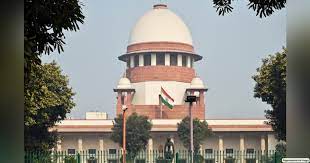


The Supreme Court in the case Udayakumar v. State of Tamil Nadu observed and has recently acquitted a man, wherein he was convicted for the offence of murder.
The bench comprising of Justice BR Gavai and Justice Sanjay Karol in the case observed and has set aside the concurrent findings of guilt being recorded by the trial court and the High Court.
In the present case, the offence allegedly took place on 22.10.2008 wherein the appellant Udayakumar murdered one, Purushothaman, Udayakumar was allegedly hired by the other two accused for committing the murder. Thus, the high court in its order stated, the court acquitted two other men who were accused as the conspirators, who also sustained the conviction of Udayakumar.
It has also been noted by the Top Court that there being discrepancy in the evidence of the Prosecution Witness, wherein it has been claimed by them to have identified Udaykumar. Thus, it has been stated by PW1 that it has been identified by him that the accused before the judge during the test identification parade, the investigating officer stated that in the police station, the first identification was done.
Further, the bench wondered that if the identity of the accused was already in the knowledge of the police or the witnesses, this court only wonder, where would the question of conducting the identification parade arise? The court observed and has reiterated that the entire necessity for holding of the investigation parade can arise of only when the accused are not previously being known to the witnesses. Therefore, the whole idea which being of the test identification parade is that witnesses who had claimed to have seen the culprits at the time of occurrence and in order to identify the culprits from the midst of other persons without any aid or any other source. The bench also made the reference of the case Heera v State of Rajasthan.
It has also been stated by the bench that the investigation parade does not hold much value when the accused identity is already being known to the witness.
Further, it has been held by the bench that if the theory of conspiracy was disbelieved and the alleged conspirators were acquitted, there being no reason or basis to upheld the conviction of A-2, more so and the same being on the basis of the very same set of evidence as it is led by the prosecution, wherein principleconspirators involved in the crime were acquitted.
The court in the matter did not find the chain of evidence to have been completely established nor the circumstances, wherein the court pointing towards the guilt of commission of crime by the Appellant.
Accordingly, the court set aside the murder conviction.